OLD ENGLISH VERB GRAMMATICAL CATEGORIES OF THE

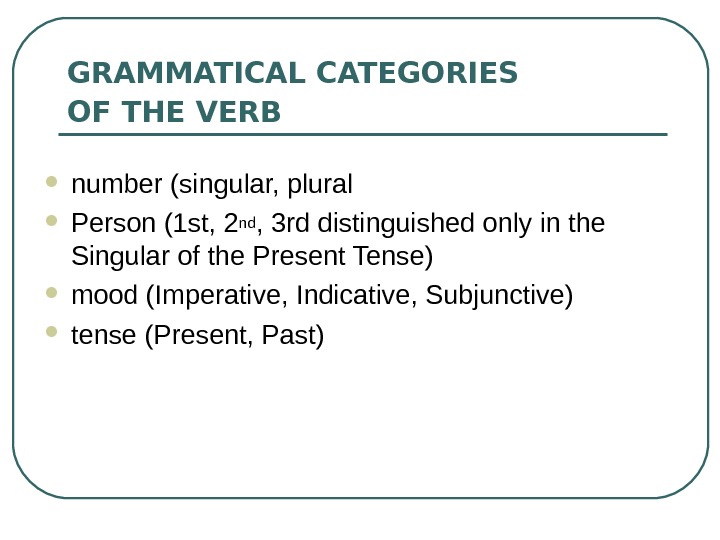
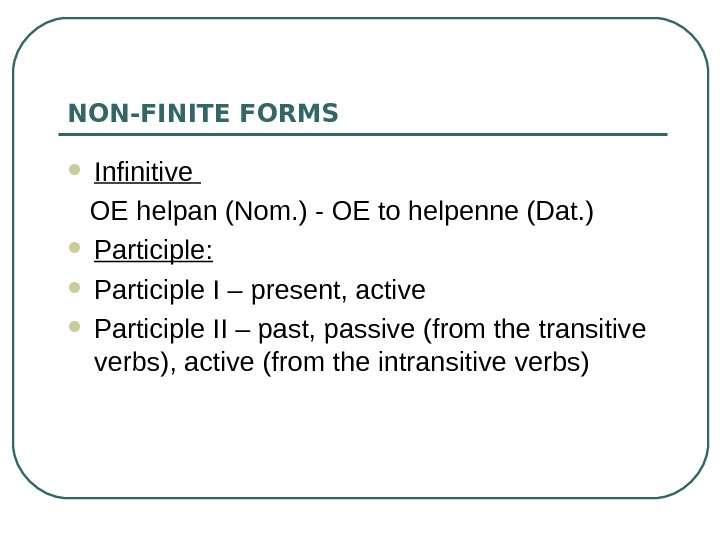
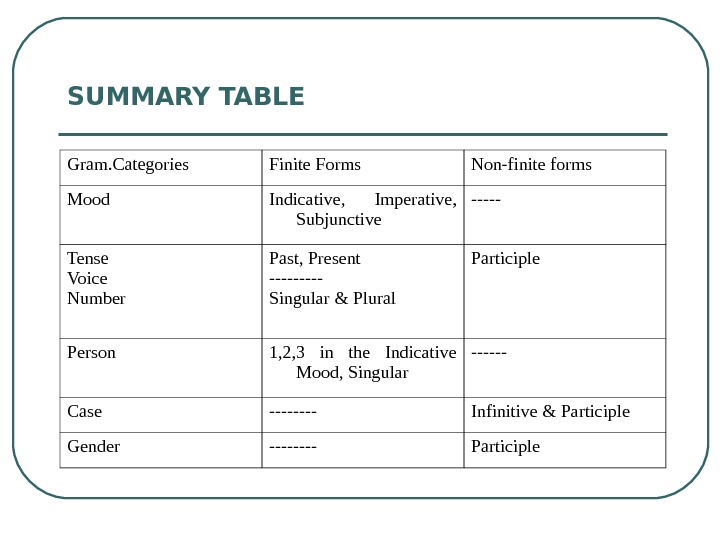
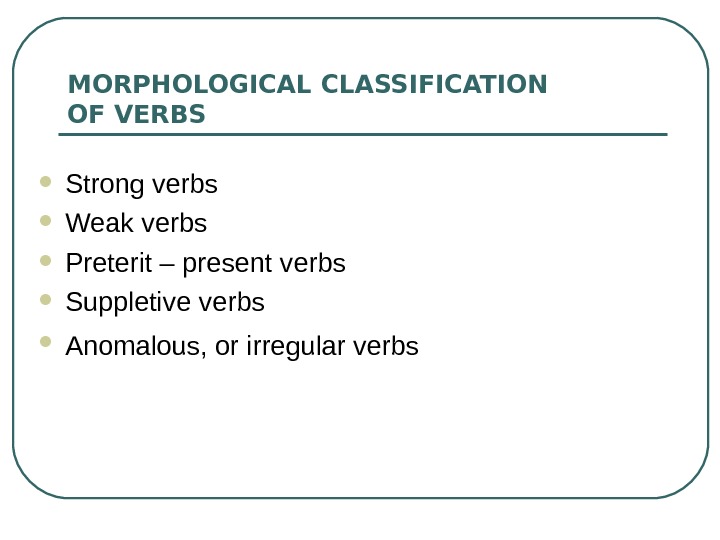
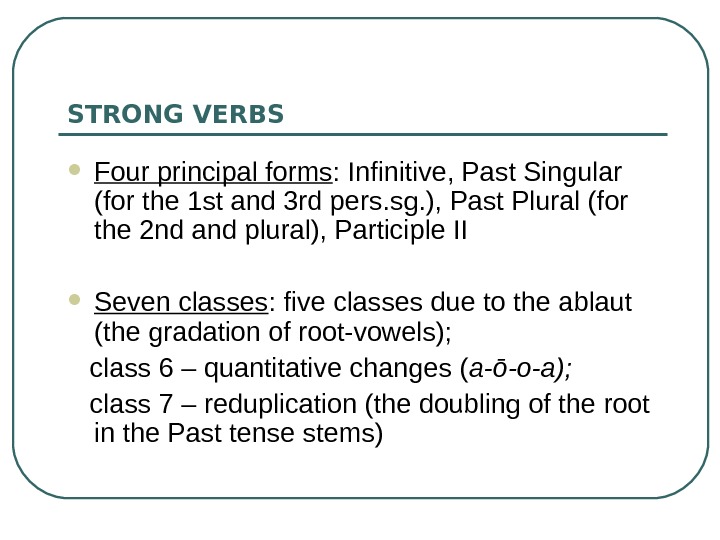
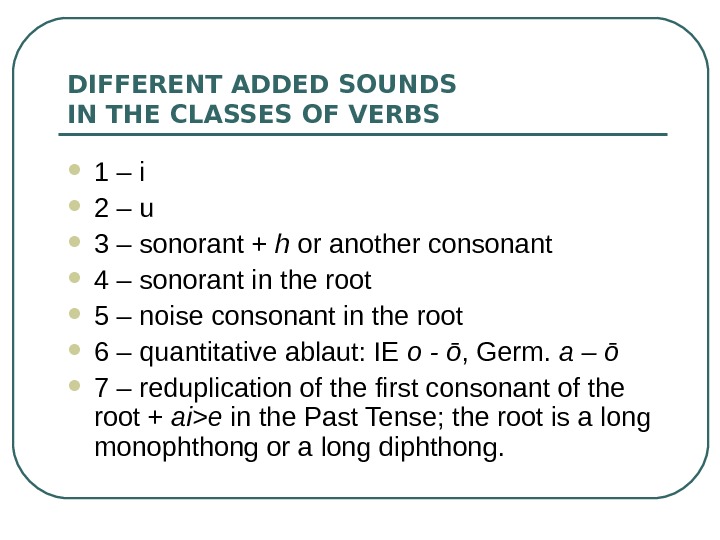
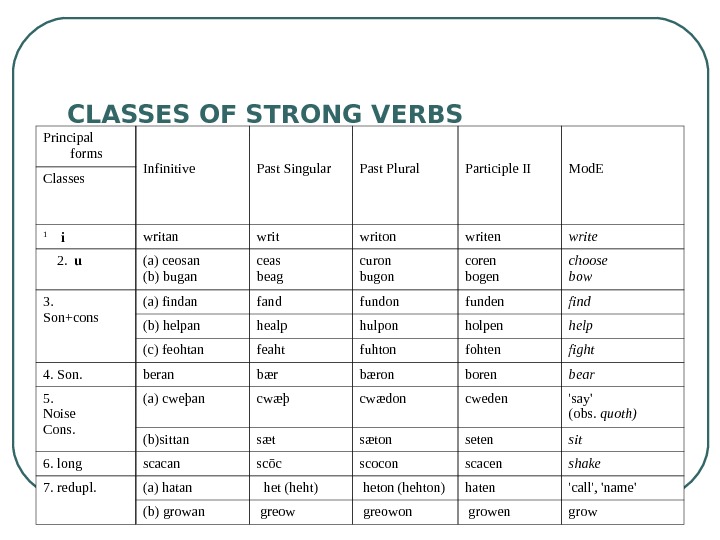
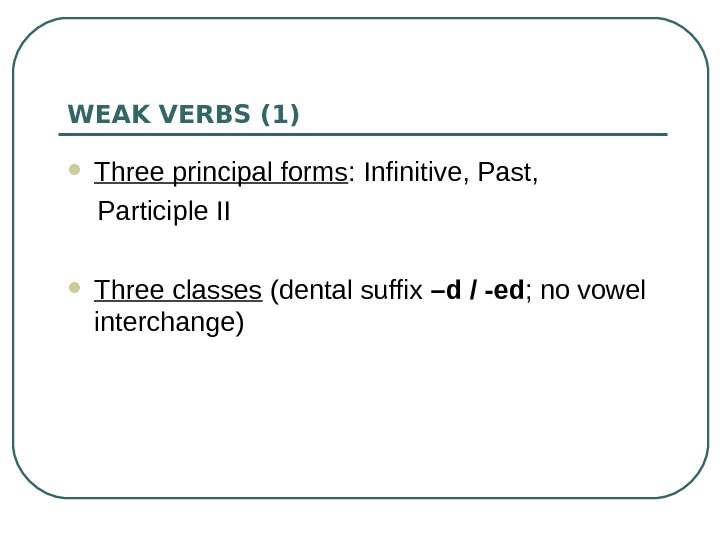
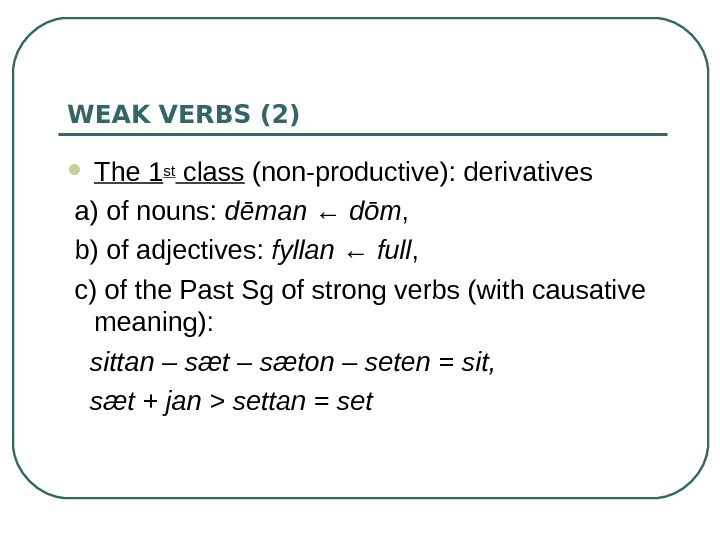
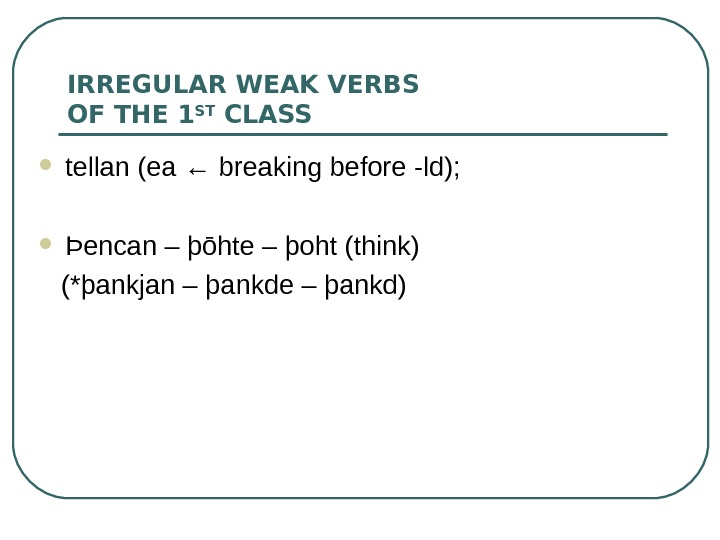
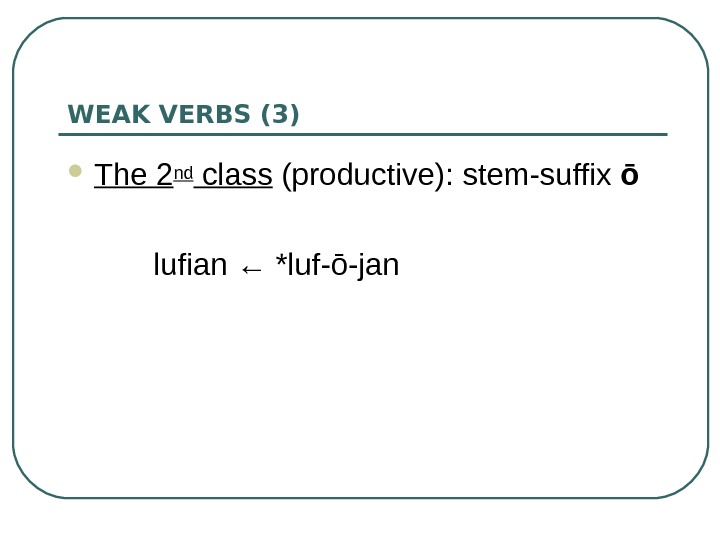
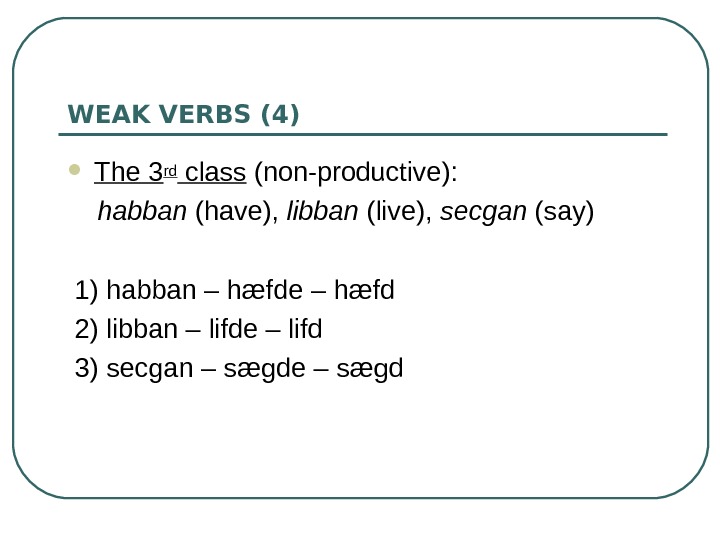
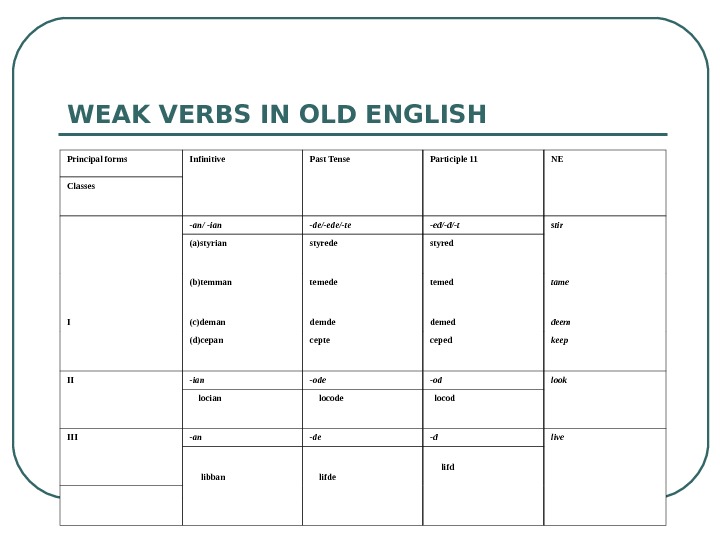
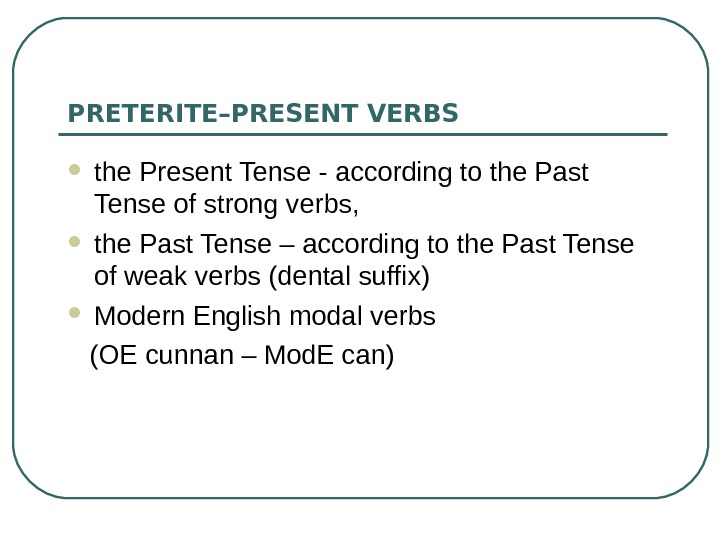
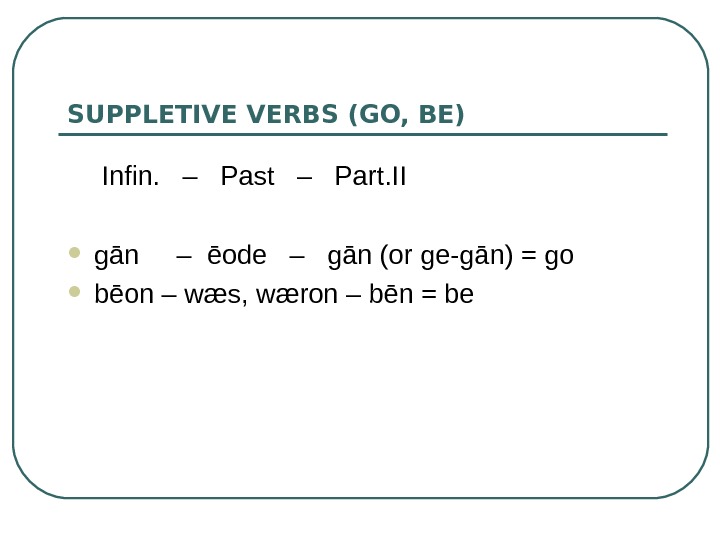
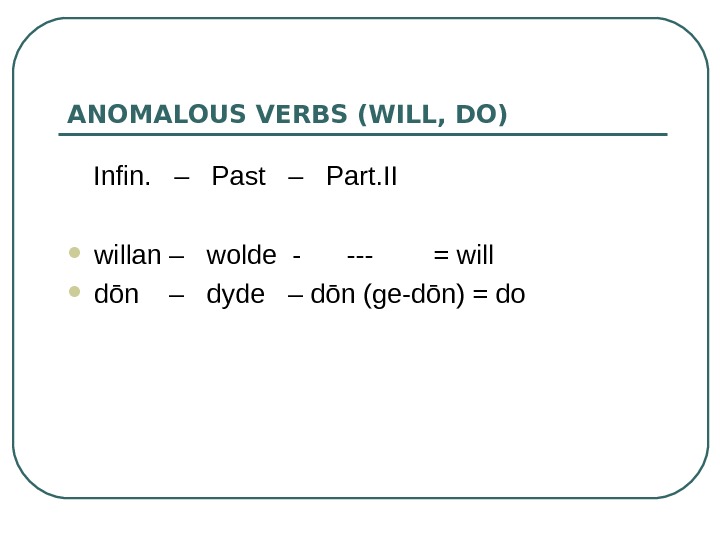
- Размер: 79 Кб
- Количество слайдов: 17
Описание презентации OLD ENGLISH VERB GRAMMATICAL CATEGORIES OF THE по слайдам
 OLD ENGLISH VER
OLD ENGLISH VER
 GRAMMATICAL CATEGORIES OF THE VERB number (singular, plural Person (1 st, 2 nd , 3 rd distinguished only in the Singular of the Present Tense) mood (Imperative, Indicative, Subjunctive) tense ( Present, Past )
GRAMMATICAL CATEGORIES OF THE VERB number (singular, plural Person (1 st, 2 nd , 3 rd distinguished only in the Singular of the Present Tense) mood (Imperative, Indicative, Subjunctive) tense ( Present, Past )
 NON-FINITE FORMS Infinitive OE helpan (Nom. ) — OE to helpenne (Dat. ) Participle: Participle I – present, active Participle II – past, passive (from the transitive verbs), active (from the intransitive verbs)
NON-FINITE FORMS Infinitive OE helpan (Nom. ) — OE to helpenne (Dat. ) Participle: Participle I – present, active Participle II – past, passive (from the transitive verbs), active (from the intransitive verbs)
 SUMMARY TABLE Gram. Categories Finite Forms Non-finite forms Mood Indicative, Imperative, Subjunctive —— Tense Voice Number Past, Present —— Singular & Plural Participle Person 1, 2, 3 in the Indicative Mood, Singular —— Case —- Infinitive & Participle Gender —- Participle
SUMMARY TABLE Gram. Categories Finite Forms Non-finite forms Mood Indicative, Imperative, Subjunctive —— Tense Voice Number Past, Present —— Singular & Plural Participle Person 1, 2, 3 in the Indicative Mood, Singular —— Case —- Infinitive & Participle Gender —- Participle
 MORPHOLOGICAL CLASSIFICATION OF VERBS Strong verbs Weak verbs Preterit – present verbs Suppletive verbs Anomalous , or irregular verbs
MORPHOLOGICAL CLASSIFICATION OF VERBS Strong verbs Weak verbs Preterit – present verbs Suppletive verbs Anomalous , or irregular verbs
 STRONG VERBS Four principal forms : Infinitive, Past Singular (for the 1 st and 3 rd pers. sg. ), Past Plural (for the 2 nd and plural), Participle II Seven classes : five classes due to the ablaut (the gradation of root-vowels); class 6 – quantitative changes ( a-ō-o-a); class 7 – reduplication ( the doubling of the root in the Past tense stems)
STRONG VERBS Four principal forms : Infinitive, Past Singular (for the 1 st and 3 rd pers. sg. ), Past Plural (for the 2 nd and plural), Participle II Seven classes : five classes due to the ablaut (the gradation of root-vowels); class 6 – quantitative changes ( a-ō-o-a); class 7 – reduplication ( the doubling of the root in the Past tense stems)
 DIFFERENT ADDED SOUNDS IN THE CLASSES OF VERBS 1 – i 2 – u 3 – sonorant + h or another consonant 4 – sonorant in the root 5 – noise consonant in the root 6 – quantitative ablaut: IE o — ō , Germ. a – ō 7 – reduplication of the first consonant of the root + ai>e in the Past Tense; the root is a long monophthong or a long diphthong.
DIFFERENT ADDED SOUNDS IN THE CLASSES OF VERBS 1 – i 2 – u 3 – sonorant + h or another consonant 4 – sonorant in the root 5 – noise consonant in the root 6 – quantitative ablaut: IE o — ō , Germ. a – ō 7 – reduplication of the first consonant of the root + ai>e in the Past Tense; the root is a long monophthong or a long diphthong.
 CLASSES OF STRONG VERBS Principal forms Infinitive Past Singular Past Plural Participle II Mod E Classes 1 i writan writon write 2. u (a) ceosan (b) bugan ceas beag curon bugon coren bogen choose bow 3. Son+cons (a) findan fand fundon funden find (b) helpan healp hulpon holpen help (c) feohtan feaht fuhton fohten fight 4. Son. beran bæron boren bear 5. Noise Cons. (a) cweþan cwæþ cwædon cweden ‘say’ (obs. quoth) (b)sittan sæton seten sit 6. long scacan scōc scocon scacen shake 7. redupl. (a) hatan het (heht) heton (hehton) haten ‘call’, ‘name’ (b) growan greowon growen grow
CLASSES OF STRONG VERBS Principal forms Infinitive Past Singular Past Plural Participle II Mod E Classes 1 i writan writon write 2. u (a) ceosan (b) bugan ceas beag curon bugon coren bogen choose bow 3. Son+cons (a) findan fand fundon funden find (b) helpan healp hulpon holpen help (c) feohtan feaht fuhton fohten fight 4. Son. beran bæron boren bear 5. Noise Cons. (a) cweþan cwæþ cwædon cweden ‘say’ (obs. quoth) (b)sittan sæton seten sit 6. long scacan scōc scocon scacen shake 7. redupl. (a) hatan het (heht) heton (hehton) haten ‘call’, ‘name’ (b) growan greowon growen grow
 WEAK VERBS (1) Three principal forms : Infinitive, Past, Participle II Three classes (dental suffix –d / -ed ; no vowel interchange)
WEAK VERBS (1) Three principal forms : Infinitive, Past, Participle II Three classes (dental suffix –d / -ed ; no vowel interchange)
 WEAK VERBS (2) The 1 st class (non-productive): derivatives a) of nouns: dēman ← dōm , b) of adjectives: fyllan ← full , c) of the Past Sg of strong verbs (with causative meaning): sittan – sæton – seten = sit, sæt + jan > settan = set
WEAK VERBS (2) The 1 st class (non-productive): derivatives a) of nouns: dēman ← dōm , b) of adjectives: fyllan ← full , c) of the Past Sg of strong verbs (with causative meaning): sittan – sæton – seten = sit, sæt + jan > settan = set
 IRREGULAR WEAK VERBS OF THE 1 ST CLASS tellan (ea ← breaking before -ld); Þencan – þōhte – þoht (think) (*þankjan – þankde – þankd)
IRREGULAR WEAK VERBS OF THE 1 ST CLASS tellan (ea ← breaking before -ld); Þencan – þōhte – þoht (think) (*þankjan – þankde – þankd)
 WEAK VERBS (3) The 2 nd class (productive): stem-suffix ō lufian ← *luf-ō-jan
WEAK VERBS (3) The 2 nd class (productive): stem-suffix ō lufian ← *luf-ō-jan
 WEAK VERBS (4) The 3 rd class (non-productive): habban (have), libban (live), secgan (say) 1) habban – hæfde – hæfd 2) libban – lifde – lifd 3) secgan – sægde – sægd
WEAK VERBS (4) The 3 rd class (non-productive): habban (have), libban (live), secgan (say) 1) habban – hæfde – hæfd 2) libban – lifde – lifd 3) secgan – sægde – sægd
 WEAK VERBS IN OLD ENGLISH Principal forms Infinitive Past Tense Participle 11 NE Classes -an/ -ian -de/-ede/-te -ed/-d/-t stir (a)styrian styrede styred (b)temman temede temed tame I (c)deman demde demed deem (d)cepan cepte ceped keep II -ian -ode -od look locian locode locod III -an -de -d live libban lifde lifd
WEAK VERBS IN OLD ENGLISH Principal forms Infinitive Past Tense Participle 11 NE Classes -an/ -ian -de/-ede/-te -ed/-d/-t stir (a)styrian styrede styred (b)temman temede temed tame I (c)deman demde demed deem (d)cepan cepte ceped keep II -ian -ode -od look locian locode locod III -an -de -d live libban lifde lifd
 PRETERITE–PRESENT VERBS the Present Tense — according to the Past Tense of strong verbs, the Past Tense – according to the Past Tense of weak verbs (dental suffix) Modern English modal verbs (OE cunnan – Mod. E can)
PRETERITE–PRESENT VERBS the Present Tense — according to the Past Tense of strong verbs, the Past Tense – according to the Past Tense of weak verbs (dental suffix) Modern English modal verbs (OE cunnan – Mod. E can)
 SUPPLETIVE VERBS (GO, BE) Infin. – Past – Part. II gān – ēode – gān (or ge-gān) = go bēon – wæs, wæron – bēn = be
SUPPLETIVE VERBS (GO, BE) Infin. – Past – Part. II gān – ēode – gān (or ge-gān) = go bēon – wæs, wæron – bēn = be
 ANOMALOUS VERBS (WILL, DO) Infin. – Past – Part. II willan – wolde — — = will dōn – dyde – dōn (ge-dōn) = do
ANOMALOUS VERBS (WILL, DO) Infin. – Past – Part. II willan – wolde — — = will dōn – dyde – dōn (ge-dōn) = do
